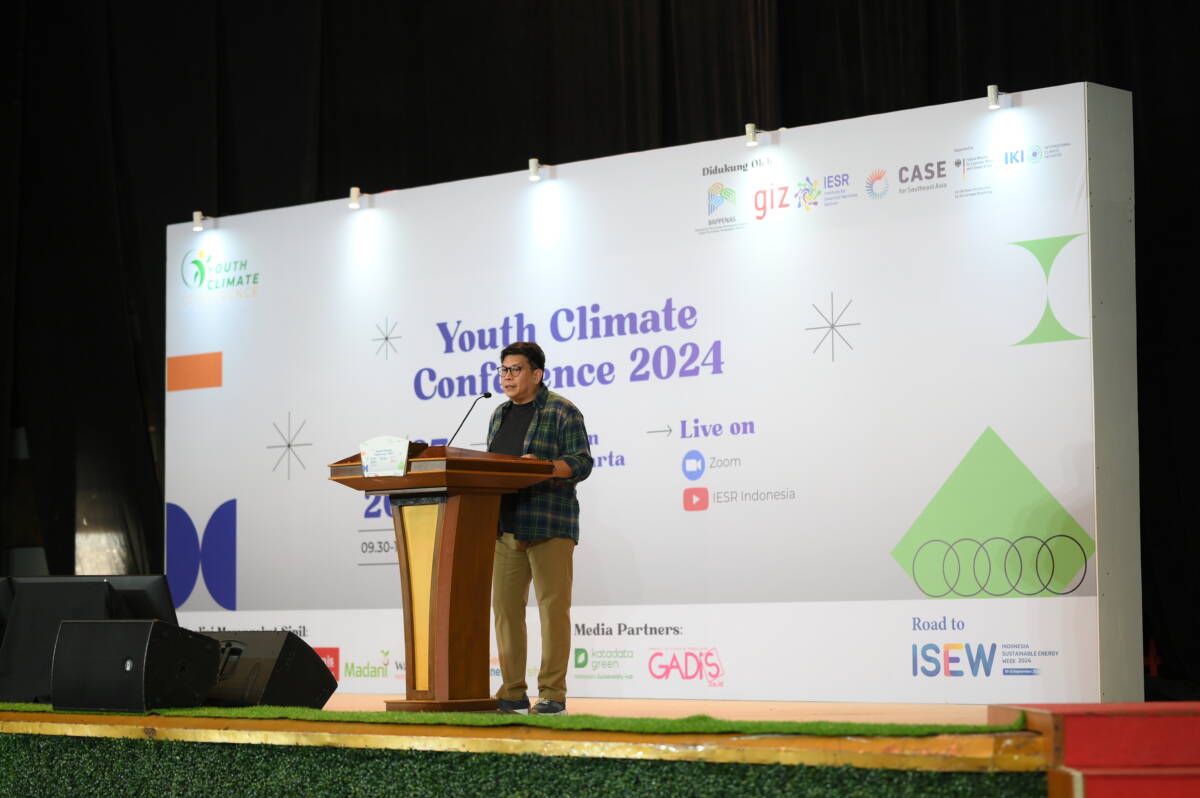
Jakarta, July 29, 2024 – The Institute for Essential Services Reform (IESR), together with the Clean, Affordable and Secure Energy (CASE) for Southeast Asia Project, encourages young people to voice the urgency for Indonesia to take an active role in climate action and an equitable energy transition to prevent the worsening of the global climate crisis. As the generation whose future will be affected by the climate crisis, the voices, aspirations, and concerns of these young people need to be heard by Indonesian policymakers and leaders. The first Youth Climate Conference (YCC) Forum was held at BRIN Auditorium, Jakarta, on Saturday (27/7/2024) to facilitate the participation of children and young people in voicing climate action. The event was supported by several Indonesian civil society organizations working on energy, environment, climate, and children, including Yayasan Cerah Indonesia, Humanis Foundation, Wahana Visi Indonesia, Madani Berkelanjutan, Generasi Energi Bersih and Koaksi Indonesia.
The process towards the YCC began with several consultations to capture the aspirations of children and young people from various regions in Indonesia since April. The YCC 2024 event was attended by more than 200 young participants eager to express their aspirations and take action to support climate mitigation and energy transition in the power sector.
Iklima Green, one of the representatives of the declarators and a student of SMAN 4 Sukabumi emphasized that the Indonesian government can maximize the use of existing renewable energy, especially in the electricity sector, through an equitable energy transition. This means that all people, especially vulnerable groups, people with disabilities, and indigenous peoples, can benefit from using renewable energy.
“As future leaders, we need support and opportunities from stakeholders to be involved in policy formulation. Our involvement in policy-making related to the climate crisis and energy transition is crucial to ensure sustainability, equity, and long-term commitment. Our involvement in the process will be a valuable learning opportunity, as well as mobilize initiatives, and encourage innovation in creating intergenerational equity in climate action, including in the aspect of energy transition in the power sector,” Iklima Green added.
Ervan Maksum, Deputy for Facilities and Infrastructure, Ministry of National Development Planning/Bappenas, said that his office is drafting the National Medium-Term Development Plan (RPJMN) 2025-2029 to realize the vision of a Golden Indonesia 2045. The RPJMN includes five essential development frameworks for the younger generation.
First, health and education will improve the quality and competitive human resources. Second, it will build the environment and increase disaster resilience and climate change. Third, infrastructure must be strengthened to support economic development and essential services. Fourth is an efficient use of energy and electricity, where the Directorate of Electricity, Telecommunications, and Informatics collaborates with the CASE program to develop a long-term energy scenario (LTES) supported by studies and public discussions. Fifth, job creation and expansion, especially in the green sector.
“Realizing the Golden Indonesia 2045 requires various prerequisites, including the acceleration of energy transition, especially electricity, which is supported by superior human resource capacity. This can be achieved if there is added value creation and the development of various innovations. For this reason, I encourage the development of leadership, especially for teenagers and youth. This is important so that the demographic bonus can support Golden Indonesia 2045,” added Ervan.
Fabby Tumiwa, Executive Director of the Institute for Essential Services Reform (IESR), said global temperatures have risen and, in the last fifteen years, have become the hottest years in hundreds of thousands of years. Recently, Extreme hot weather disrupts daily human activities, reduces work productivity, and can even cause death. Extreme weather will become more frequent and intense as the Earth’s temperature rises due to increased greenhouse gas emissions in the atmosphere.
“We must make a collective effort to encourage our leaders to ensure that Indonesia’s climate action is consistent with the goals of the Paris Agreement. However, the actions of each individual also have an important contribution in reducing the pace of the climate crisis. Simple, tangible actions such as turning off unused electricity, utilizing public transportation, reducing the use of bottled water and using electricity from renewable energy, such as rooftop solar power plants, can make a big difference. If millions of individuals do this, then the impact can bring positive changes to the Earth,” said Fabby.
This YCC forum gave birth to the Youth Declaration for Climate and Energy Transition, which contains concrete commitments and recommendations for the government and industry in encouraging clean energy transition towards Indonesia Emas 2045. Some of the aspirations conveyed are:
- Reducing dependence on fossil energy to mitigate the climate crisis and create clean air without pollution from burning coal
- Utilization of renewable energy and increased energy access in remote areas
- Implementation of a just energy transition to reduce greenhouse gas emissions, improve national energy security, and create new jobs
- Protect and restore ecosystems through implementing policies that support adaptation to climate change
- Involving young people in policy formulation related to the climate crisis and equitable energy transition, providing learning opportunities, and contributing to young people as agents of change to achieve net zero emissions by 2060 or sooner.

